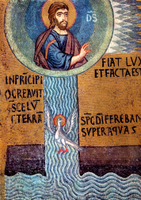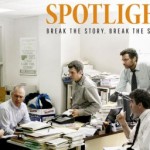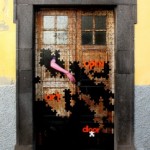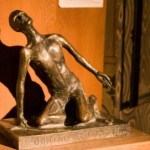The desiccation of grasslands, restraint of princes,
Piracy on the high seas, physical pain and fiscal grief,
These after all are our familiar tribulations,
And we have been through them all before, many, many times.
. . . That was why
We were always able to say: “We are children of God,
And our Father has never forsaken His people.
— W. H. Auden, Narrator in the Advent section of
For The Time Being: A Christmas Oratorio.
![]() John has forsaken every familiar thing in this world, the comforts of town and culture, the clothing, even the food, shunning all of it to become a lone, wild thing. Suppers of lamb and tsimmis, with rugelach and almond cakes and sweet wine to wash it down, are behind him now. He has become a vegan living off the land, drinking river water. His single purpose is to cry out from the wilderness, Fools! Nothing familiar can save you from the approaching Spirit of God. Nothing you know, nothing you remember, neither your feasts nor your fasts nor your ancestors can avail you now.
John has forsaken every familiar thing in this world, the comforts of town and culture, the clothing, even the food, shunning all of it to become a lone, wild thing. Suppers of lamb and tsimmis, with rugelach and almond cakes and sweet wine to wash it down, are behind him now. He has become a vegan living off the land, drinking river water. His single purpose is to cry out from the wilderness, Fools! Nothing familiar can save you from the approaching Spirit of God. Nothing you know, nothing you remember, neither your feasts nor your fasts nor your ancestors can avail you now.
He roars special contempt upon the pious, who have translated faith into habits and observances, the very opposite of wonder, mystery and awe. They are the good church folk of his time, of our own time, of every time. They preserve customs – the church fairs they learned from their grandmothers, the old familiar carols, the festivals carefully packed away from year to year. They bring them out, dust them off, hang them up, light the candles, yawn a bit as the service progresses, and are away home at the end, satisfied that they and God have come close enough.
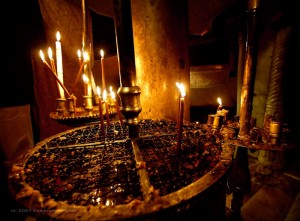 John knows this and only this: it is a hollow sham. The wild tiger spirit of God approaches, as the prophet Haggai said, to shake all nations, and the desire of all nations shall come: and I will fill this house with glory, says the Lord.
John knows this and only this: it is a hollow sham. The wild tiger spirit of God approaches, as the prophet Haggai said, to shake all nations, and the desire of all nations shall come: and I will fill this house with glory, says the Lord.
Perhaps the most important of John’s howling words for us to hear is: God is able from these stones to raise up children for Abraham.
The self-importance of being people of covenants and Advent candles, who know the right readings for the right occasions, who hold the world together for and through Abraham, falls away before these new creations, the stone children, fresh from the hand of God with a new word of life breathed into them. Their faith is not inherited from us. It is grace given.
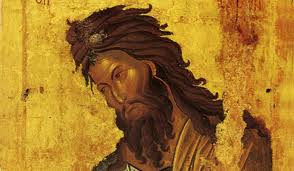 As well, John urges us away from the temptation of dwelling on Mary’s womb as the moment and the place, or on Jesus’ gender as the defining aspect, or on anything that can be a stumbling block to our own hour in the presence of the Holy Spirit. The Spirit pours from Mary as it has from John, in her sung devotion to the One who pulls the mighty from their thrones, exalts those of low degree, scatters the proud in the imaginations of their hearts, fills the hungry with good things, sends the rich empty away.
As well, John urges us away from the temptation of dwelling on Mary’s womb as the moment and the place, or on Jesus’ gender as the defining aspect, or on anything that can be a stumbling block to our own hour in the presence of the Holy Spirit. The Spirit pours from Mary as it has from John, in her sung devotion to the One who pulls the mighty from their thrones, exalts those of low degree, scatters the proud in the imaginations of their hearts, fills the hungry with good things, sends the rich empty away.
This is the unquenchable fire. This is the grandeur of God. And this is the wrath to come. John sees this, sees even as he baptizes the motley thousands. Josephus, the Roman historian, wrote of crowds as large as fifty thousand going out to the wilderness to hear John, but John sees that none of it is important, not the water, not the words, not the people kneeling in the river. In the end what it comes to is the unquenchable fire of the Holy Spirit, who will close every age we open, who will fill the world with children not because we are virtuous, but because even stones are fruitful when God touches them.
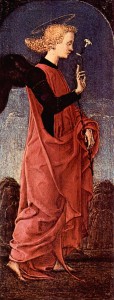 Mary will take that fire into herself, not because she is a pure virgin but because she sees with a prophetic eye, because she is willing to burn as John, and all the prophets before him, have burned. And when Jesus meets John at the river, standing waist deep with John pouring water over him, the fire burning in Jesus will flame out, and they will all see – unquenchable fire.
Mary will take that fire into herself, not because she is a pure virgin but because she sees with a prophetic eye, because she is willing to burn as John, and all the prophets before him, have burned. And when Jesus meets John at the river, standing waist deep with John pouring water over him, the fire burning in Jesus will flame out, and they will all see – unquenchable fire.
Often, in our churches, we name these Advent weeks sweetly, as Hope, Joy, Love, Peace. The texts name them otherwise: Bleak Earth. UnquenchableFire. Spirit in Darkness. Birth. This is the kind of time Auden describes: The Inevitable is what will seem to happen to you purely by chance; The Real is what will strike you as really absurd.
Yet neither John, nor Mary, nor Auden, are speaking about a time of winnowing the world by egos, or by totting up sins and virtues, or by sorting abstinence from indulgence. The winnowing will be of time itself, a sorting of the wheat of life from the political, religious, and folkloric foolishness of the ages. Here, then, comes John, crying out: I baptize you with water for repentance, but one who is more powerful than I is coming after me . . . . He will baptize you with the Holy Spirit and fire. His winnowing fork is in his hand, and he will clear his threshing floor and will gather his wheat into the granary; but the chaff he will burn with unquenchable fire.
The unquenchable fire, which is of God and is God, is not hellfire. It is the fire of redemption through re-creation. John struggles to tell us that God has not finished making the world. God is at work in it, is near, will shape us, and soon. We see the making of new earth in the deltas of rivers and the bogs of lakes, in the new isles which volcanos throw up into the sea. We are all in the fire of change.
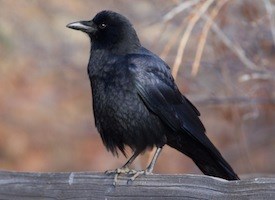 Sylvia Plath tells Advent time in her poem Black Rook in Rainy Weather:
Sylvia Plath tells Advent time in her poem Black Rook in Rainy Weather:
Ignorant of whatever angel
may choose to flare suddenly at my elbow,
I only know that a rook,
ordering its black feathers,
can so shine as to seize my senses
and grant a brief respite from fear.
The wilderness is full of voices. Advent is a listening time.
___________________________________________
- Water. Creation, Day 1. Vanderbilt Divinity School Library. Art in the Christian Tradition.
- John the Baptist. Coptic Icon. Vanderbilt Divinity School Library. Art in the Christian Tradition.
- Grotto of the Nativity. Christopher Chan, 2007. Bethlehem, Palestinian Territories. Vanderbilt Divinity School Library. Art in the Christian Tradition
- John the Baptist. Contemporary Icon.
- Angel of the Annunciation. Ture, Cosme. 1474. National Gallery of Art, Washington, D.C. Vanderbilt Divinity School Library, Art in the Christian Tradition.
- American Crow. Photo by Christopher L. Wood, Cornell Lab of Ornithology website image.

